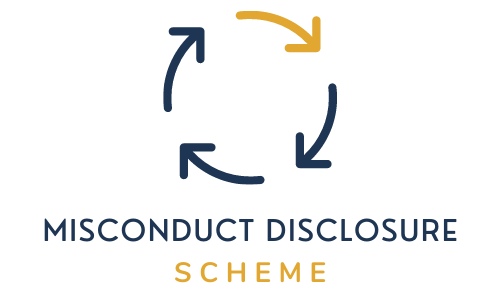Misconduct Disclosure Scheme
Advisory Panel
Recommendations - 2022
The MDS Advisory Panel recommended that these changes be ratified and made in the call on the 10th February 2022. These changes were confirmed by Andrew Morley, Chair of SCHR, on 18th March 2022.
The following changes have been proposed by professionals from Implementing Organisations and the MDS Coordinator, in accordance with the governance process as outlined here.
List of agreed changes:
1) Discussion among the signatories about making the MDS more accessible to local and national actors. A critical mass required to make the MDS a standard depends on such an effort.
It is recommended to make no changes to the Scheme and instead focus on improving the efforts in implementation in operational contexts by current Implementing Organisations and using the findings to inform the focused roll-out and to encourage local organisations to sign up.
2) Requesting Statement of Conduct: extending the current minimum requirement for checks to go back at least 5 years to 10 years.
The panel recommended not to amend the Scheme and leave the requirement of 5 years as a minimum requirement for checks. SCHR is to encourage Implementing Organisations to conduct checks for more than 5 years if possible.
3) Agreeing on a common timeline for responses to misconduct requests.
Implications: a suggested timeline of ten (10) working days for Implementing Organisations responding to requests should be introduced and all Implementing Organisations should let requesting organisations know if they are not able to provide references within agreed time.
The panel recommended that this change be ratified. In addition to this change, a formal protocol was introduced to ensure a transparent process to follow up on any issues with Implementing Organisations arising in the future.
4) Expanding the scope of the Scheme so that it is applicable to all categories of staff (e.g. volunteers, consultants, staff in governing positions).
Implications: The clause 4.4 of the Scheme will be changed to make it clear that while the obligation is to apply MDS checks to regular employees only, all Implementing Organisations are encouraged to apply MDS checks to all their new hires (this includes regular staff, consultants, contractors, board members, volunteers).
The panel recommended that this change be ratified.
5) Participating organisations to make it a standard practice to update contact details for authorised focal points available in the registry on the SCHR website regularly.
Implications: While the establishment of the registry of authorised focal points to disclose references has been approved by the SCHR Chair in 2020, these are not updated regularly by all organisations. The MDS Coordinator is responsible for running randomised checks but as the number of IOs is growing, it is not possible to test all emails regularly.
The panel recommended that this change be ratified
6) Implementation data: removing one of the indicators (The number of misconduct data responses provided to other organisations requesting such data) due to its ineffectiveness.
Implications: Implementing Organisations will no longer monitor and submit the number of misconduct data responses provided to other organisations.
The panel recommended that this change be ratified
